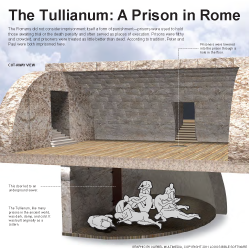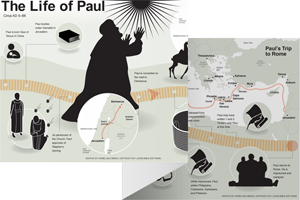1:1–2 From prison, Paul writes to the Christians at Colossae (Col 4:3, 10)—whom he may have never met (compare v. 4)—to encourage their progress in the faith (vv. 9–10). His location at this time is uncertain. If he was in Ephesus, roughly 120 miles west of Colossae, then he wrote the letter around ad 54–57; he also could have written it during imprisonments in Caesarea (ad 58–60) or Rome (early 60s ad; see note on Phil 1:7). |
1:1 Paul Formerly known as Saul, he persecuted the early Christians until a dramatic encounter with the risen Christ led to him becoming Christianity’s most prolific missionary (Acts 8:1–3; 9:1–22; see note on Rom 1:1). He preached the gospel and planted churches throughout Asia Minor, Macedonia, and Greece, but there is no record that he ever visited Colossae.
 Paul: A Life of Redemption and Transformation
Paul: A Life of Redemption and Transformation
Paul was born a Roman citizen (Acts 22:28) and grew up in the city of Tarsus |
apostle A person designated by God to speak and act with special authority. Paul did not always refer to himself as an apostle (Phil 1:1), but does so here to establish his credentials among the Colossians, most of whom he had never met (Col 2:1).
(Phil 1:1), but does so here to establish his credentials among the Colossians, most of whom he had never met (Col 2:1).
 Pauline Self-Designations Table
Pauline Self-Designations Table
Timothy Served with Paul in the region west of Colossae and might have been known by the believers there.
A disciple and companion of Paul. Timothy |
1:2 saints The Greek word used here, hagioi, often translated “saints” or “holy ones,” refers to those who are set apart or who belong to God.
Colossae A city located in southwest Asia Minor (modern-day Turkey). In the first century ad, Colossae was a small agricultural community in Phrygia,
located in southwest Asia Minor (modern-day Turkey). In the first century ad, Colossae was a small agricultural community in Phrygia, a region known for an obsession with magic
a region known for an obsession with magic and the occult. The church at Colossae apparently was planted by a man named Epaphras (see Col 1:7 and note), who also ministered in the nearby cities of Laodicea and Hierapolis (4:12–13).
and the occult. The church at Colossae apparently was planted by a man named Epaphras (see Col 1:7 and note), who also ministered in the nearby cities of Laodicea and Hierapolis (4:12–13).
Grace to you and peace See note on Rom 1:7.
God our Father See note on Rom 1:7.
1:3–23 Paul expresses gratitude for the Colossian believers and a desire that their witness to Christ’s lordship will mature and grow. Embedded within this passage is a hymn to Christ that affirms His authority over all things (Col 1:15–20). The importance of this theme becomes evident later in the letter, as Paul confronts false teachings that apparently were gaining a foothold in the Colossian church (2:4, 8, 16–23; see note on 2:8). In ch. 1, Paul’s references to false teaching are subtle; he is preparing his audience for the more direct discussion in ch. 2. |
1:3 We give thanks See note on Rom 1:8.
1:4 faith The Greek word used here, pistis, refers to trust and reliance. Paul is thankful that the Colossians—under the threat of false teaching—have anchored their faith in Christ.
love The greatest of the three Christian virtues (1 Cor 13:13), the others being faith and hope. The natural result of faith in Christ is love (agapē in Greek) for God and others.
The Greek word agapē, often translated “love,” is a general word for affection and warm regard. The nt uses the word to describe compassion for other people, love for God or Christ, and the love God and Christ have for humanity and for each other. The gospel message makes the love denoted by agapē more of a mindset than a feeling. It involves putting the needs and interests of others before your own—even enduring suffering and hardship for the sake of others. |
1:5 hope reserved for you The Greek word used in this phrase, elpis, often rendered as “hope,” refers to confident expectation, not wishful thinking. The Colossians have hope because of their union with Christ (Col 1:27). This means they are free from corruption and death and are qualified to participate in Christ’s life, resurrection and glory. Paul reminds them that their hope of a glorious future does not come from a religious philosophy (2:8), but from God. Therefore, they do not need to accept the demands of false teachers.
word of truth Paul wants the Colossians to know that the gospel message they received is God’s true revelation. See note on v. 9.
1:7 Epaphras A believer who shared the gospel message with the Colossians. Paul later describes him as a servant-hearted leader who works hard on behalf of Christians in Colossae, Laodicea, and Hierapolis (4:12–13).
slave This description of Epaphras does not mean that he was literally a servant or slave. Rather, Paul is using figurative language to characterize Epaphras as a humble servant of God.
1:9 knowledge of his will Refers to the believers’ awareness of Christ’s desires for how they ought to conduct themselves (see vv. 10–12). False teachers might have described God’s will as unknowable—or knowable only through secret rituals. Paul rejects this idea: Followers of Christ, filled with the knowledge of His will, can live in a manner pleasing to God because they know what matters to Him.
wisdom The biblical conception of wisdom is oriented around God as the source of all wisdom; a wise person is a godly person (Hos 14:9; Col 4:5; Rom 16:19).
person is a godly person (Hos 14:9; Col 4:5; Rom 16:19).
spiritual insight Refers to insight that comes from the Spirit. This stands in contrast to the mystery religions, which promoted insight through secret rituals.
which promoted insight through secret rituals.
1:10 live in a manner worthy The purpose of having knowledge, wisdom, and insight is not to boast or brag, but to love God and others, thereby reflecting His image in the world.
knowledge of God Refers to experiential knowledge, not just intellectual understanding. As believers trust and obey God’s will, they become more acquainted with God’s ways—and with God Himself.
1:12 qualified you for a share of the inheritance As non-Jews (Gentiles), the Colossians would have been considered outsiders to God’s blessings, which were reserved for the people of Israel. However, the central truth of the gospel for Paul was that Christ’s death and resurrection brought salvation for all who believed, Jews and Gentiles alike.
1:13 domain of darkness Refers to the realm dominated by sin and death (compare Eph 6:12).
kingdom The realm in which Christ reigns as King, where His sovereign rule is carried out. The transfer from one realm to the other is accomplished by God: In His love and grace, He brings believers out of the domain of sin and death and moves them into the kingdom of His Son.
 The Kingdom of God: Already but Not Yet
The Kingdom of God: Already but Not Yet
1:14 redemption Refers to the act of freeing someone who is enslaved. Just as Israel was enslaved in Egypt before being rescued by Yahweh, so the Colossian believers had been enslaved to the domain of sin and death before they responded in faith to God’s act of salvation in Christ (Exod 6:6; 14:30; compare Rom 6:16–17).
forgiveness God’s forgiveness removes sin (Col 2:14) and provides reconciliation (v. 22). Forgiveness is an expression of God’s grace and love.
 Aphesis Word Study
Aphesis Word Study
1:15–20 Paul proclaims the supremacy and sovereignty of Christ, who was present and active in the creation of the universe and who remains active in sustaining and reconciling all things. Whether Paul himself wrote this hymn is debated; he could have borrowed material used in early Christian worship. Regardless of authorship, the hymn is a central component of the letter, providing the basis for Paul’s key points in chs. 2–3 about the sufficiency of Christ and the futility of false teachings. Because God’s fullness dwells in Christ (v. 19), He is all that believers need. |
1:15 image of the invisible God Jesus Christ makes the Father and the Spirit visible to people. Paul later draws on the notion of resembling God when writing about how people should treat one another (3:10).
to people. Paul later draws on the notion of resembling God when writing about how people should treat one another (3:10).
firstborn In this context, the Greek word used here, prōtotokos, affirms Christ’s supremacy and sovereignty over all things (see vv. 17–18).
1:16 things visible and things invisible These terms refer to earthly creatures and spiritual beings.
all things were created through him There is nothing outside the scope of Christ’s sovereignty. Since all things—natural and supernatural—were created through Him, they are subject to His authority.
1:18 head Indicates Christ’s leadership of the Church. His authority and empowerment enable the body of Christ to grow and mature.
church The Greek word used here, ekklēsia, refers to an assembly of people. In Christian contexts, it describes the people who assemble in the name of Christ.
 The Church Devotional
The Church Devotional
 Ekklēsia Word Study
Ekklēsia Word Study
the firstborn from the dead Refers to Jesus’ resurrection, which Paul regards as a template for the resurrection of all believers (e.g., 1 Cor 15:20–23; 1 Thess 4:14). Compare Col 1:15 and note.
1:19 all the fullness to dwell in him Refers to God being fully present in Christ, parallel with Paul’s statement in 2:9. Consequently, Christ is sufficient for the Colossians’ salvation.
1:20 reconcile The Greek word used here, apokatallassō, refers to the act of restoring a relationship to harmony. The purpose of Christ’s death on the cross was to bring all things created by Christ and for Christ (Col 1:16) into harmonious relationship.
1:22 his physical body Christ was not an angel or a nonphysical being; He had a body, and He endured suffering and death in His body. By emphasizing Christ’s physical body, Paul may be combatting early gnostic-like influences that could have been at work in Colossae. Gnostics emphasized spiritual, nonmaterial reality over the material world, prompting some people to deny that Christ had a physical body. Gnostics wrongly considered material reality to be evil and sought to escape it through abstaining from worldly comforts and pleasures. While fully developed Gnosticism postdates the nt, the beliefs Paul seems to be addressing here resemble later gnostic thought.
influences that could have been at work in Colossae. Gnostics emphasized spiritual, nonmaterial reality over the material world, prompting some people to deny that Christ had a physical body. Gnostics wrongly considered material reality to be evil and sought to escape it through abstaining from worldly comforts and pleasures. While fully developed Gnosticism postdates the nt, the beliefs Paul seems to be addressing here resemble later gnostic thought.
holy Describes belonging to or being set apart for God. The Colossians cannot claim responsibility for their status before God; no human tradition or rule made them holy. Rather, Christ’s work of reconciliation brought them into relationship with God, making them holy. Since believers belong to God, they bear His image (3:10), which enables them to live out God’s command to holiness.
1:23 if indeed you remain in the faith Paul seems to be acknowledging that the Colossians are at a crossroads. He charges them to continue trusting in Christ and living out the gospel message. However, they must refuse to observe the rules and traditions of false teachings, which threaten to lead them in a different direction. They must remember that faith in Christ is not simply a way of entering God’s kingdom—it is the way of life within the kingdom (Hab 2:4; Rom 1:17).
hope of the gospel Refers to living in union with Christ and sharing in Christ’s resurrection (compare Col 1:27).
1:24–29 The center of this passage is God’s plan of salvation, revealed in Christ and expanded to include Gentiles (non-Jews) as well as Jews. |
1:24 I rejoice in my sufferings Paul refers to his imprisonment (4:3), which he considers part of his calling—not a cause for shame. His attitude serves as a model for the Colossians of how to endure hardship for the sake of others.
what is lacking of the afflictions of Christ This difficult phrase might refer to the hardships traditionally expected to befall the Messiah’s people in advance of His return (sometimes called the “messianic woes”). The idea behind this tradition was that a certain amount of suffering was necessary before God’s people would be vindicated. Paul seems to be referring here to this remainder of afflictions that the Church must endure. He considers his own sufferings to represent some portion of this remainder; in this way, he is suffering on behalf of the Church (compare 2 Cor 1:5; 4:10; Phil 3:10).
1:26 mystery Refers to God’s plan of salvation revealed through the death and resurrection of Christ. This specifically involves Christ’s ministry of reconciliation, which unites Gentiles (non-Jews, such as the Colossians) with Jews and creates one people of God (e.g., Eph 3:6–9).
1:27 mystery among the Gentiles The Colossians’ non-Jewish ethnicity did not exclude them or disqualify them from God’s promises and plan. On the contrary, the work of Christ makes them eligible to share in the inheritance of God’s people (v. 12). The inclusion of Gentiles into the people of God was always part of God’s plan of salvation (Gen 12:3; Isa 49:6; Gal 3:8).
into the people of God was always part of God’s plan of salvation (Gen 12:3; Isa 49:6; Gal 3:8).
Christ in you Refers to union with Christ.
1:28 wisdom See note on Col 1:9.
every person False teachers may have promoted special knowledge that was available only to a select few. Paul wants the Colossians to understand that the truth and wisdom of the gospel is available to everyone in their congregation; all believers are called to full maturity in Christ.
1:29 labor Paul explains that he, too, is on the path to Christian maturity. Like all believers, he is pursuing the hard work of discipleship in cooperation with Christ’s indwelling presence.

|
About Faithlife Study BibleFaithlife Study Bible (FSB) is your guide to the ancient world of the Old and New Testaments, with study notes and articles that draw from a wide range of academic research. FSB helps you learn how to think about interpretation methods and issues so that you can gain a deeper understanding of the text. |
| Copyright |
Copyright 2012 Logos Bible Software. |
| Support Info | fsb |
 Loading…
Loading…





 Paul
Paul 